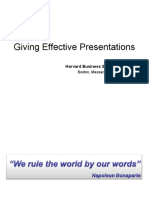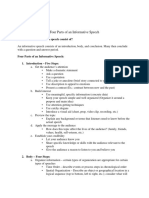Oral Presentations
Oral Presentations
Uploaded by
Stefania SocherelCopyright:
Available Formats
Oral Presentations
Oral Presentations
Uploaded by
Stefania SocherelCopyright
Available Formats
Share this document
Did you find this document useful?
Is this content inappropriate?
Copyright:
Available Formats
Oral Presentations
Oral Presentations
Uploaded by
Stefania SocherelCopyright:
Available Formats
UK Student Portal
1 of 5
http://www.uk-student.net/modules/wfsection/print.php?articleid=67
ORAL PRESENTATIONS
Date: Tue, 26-Jul-2005
Section: Presentations
This short guide is based on the materials used in the Oral Presentations workshop which forms
part of the study skills workshops programme. The material included has been gathered and
adapted from:
Developing Essential Study Skills Elaine Payne and Lesley Whittaker
Studying Successfully by Ray Baxter
Study skills handouts in the Student Centre.
University of Surreys on-line guide www.surrey.ac.uk/Skills/Pack/pres.html
See also:
"How not to give a presentation" http://bmj.com/cgi/content/full/321/7276/1570
WHAT MAKES AN EFFECTIVE PRESENTATION?
A good introduction
A good conclusion
Clear outcomes
Appropriate material
Well organised material
Clear, logical progression
Good supporting information data, examples, illustrations
Retention of interest
Appropriate use of visual aids/handouts
Good rapport with audience
Appropriate use of language
Good voice control
GIVING A PRESENTATION MAIN STAGES
Initial preparation
11/10/2015 6:34 PM
UK Student Portal
2 of 5
http://www.uk-student.net/modules/wfsection/print.php?articleid=67
Before planning your presentation, consider:
Your remit
Your objectives
Your audience
Your venue
Planning the presentation
Select and structure the main points and supporting information in a logical, coherent way
Rehearsal
Practice makes perfect! Be familiar with your material, your venue and any equipment.
Delivery
Effective delivery involves capturing and retaining the audiences attention, inspiring their
confidence and developing their understanding.
INITIAL PREPARATION
The design and tone of your presentation will be affected by:
Your remit
How much time have you been allotted?
How much can you get across in that time?
Have any content guidelines been set?
(e.g. title, fixed number of OHTs)
Is a common format/style required?
Your objectives
What do you want your audience to take away from the presentation?
Is your aim to explain, inform, persuade, debate or entertain?
Your venue
Room size, layout, seating arrangements
Availability of audio visual equipment
Lighting, temperature, general comfort level
Your audience
Who are they? What are their jobs/positions?
Why are they there? Are they there voluntarily or under pressure?
What is their likely attention span?
What do they already know about the topic?
How can you link new information to what they know?
Is their response likely to be positive or negative?
11/10/2015 6:34 PM
UK Student Portal
3 of 5
http://www.uk-student.net/modules/wfsection/print.php?articleid=67
Will you need to win them over to a particular viewpoint?
Will anyone else be speaking for or against?
What level will you need to gear your information to?
You may need to avoid technical jargon and explain abstract concepts with clear, practical
examples.
PLANNING YOUR PRESENTATION
Choose the main points (3 max. in a 10 minute presentation)
These should reflect your objectives and take
account of your audiences needs.
Arrange main points in a logical, structured way which is relevant to the subject:
e.g. chronological, cause/effect, problem/solution
Choose supporting information to:
add clarity - explain complex terms through concrete examples, illustrations; remind audience of
supporting themes
add authority quote experts; make connections with other peoples work; offer evidence from
research
add colour video clips/slides; practical examples; analogies
Decide best way to present this information.
Establish linking statements to show how main points fit together
Develop your opening:
introduce yourself
capture the audiences interest, establish a relationship
say what you will be talking about and how
say what you hope to achieve
- say what you expect of the audience to
listen, take notes, ask questions (during, after?)
- inspire confidence
Develop your ending:
review the subject area
summarise the main points and the process
draw the points to a conclusion/judgement
leave a lasting impression
Review
Does your presentation meet your objectives?
Is it logically structured?
Is it targeted at the right level?
Is it too long/short?
11/10/2015 6:34 PM
UK Student Portal
4 of 5
http://www.uk-student.net/modules/wfsection/print.php?articleid=67
Prepare notes
linear notes or index cards?
number and keep in right order
note main headings and key words as prompts
DELIVERING AN EFFECTIVE PRESENTATION
Rapport
o smile, be welcoming
o check comfort levels
o look for non-verbal signs of confusion/boredom
o address audience directly, dont read from notes
o check understanding
o invite questions
o show confidence through posture and body language
o maintain eye contact
o use controlled gestures to welcome, include, emphasise, indicate ending
Appropriate language:
Use language that involves you with the audience, e.g. use "we", ask rhetorical questions.
Express ideas clearly:
o avoid jargon, clich
o summarise regularly
o vary sentence length, openers, types (statement, command, question, exclamation)
o avoid messy, rambling endings or fillers
o use verbal signposts to direct listening
Voice control
Use your voice to maintain interest, convey energy and enthusiasm:
o volume loud enough for audience to hear, but vary for effect
o pace speak slowly and clearly, use pauses to indicate change of direction or to emphasise a
point
o pitch e.g. raise for questions
Practical tips
Practice makes perfect! Rehearse your presentation.
Be familiar with your material and equipment
Get a good nights sleep
11/10/2015 6:34 PM
UK Student Portal
5 of 5
http://www.uk-student.net/modules/wfsection/print.php?articleid=67
Arrive early to check layout, equipment etc.
Have a warm drink beforehand to relax throat
Have a drink of water to hand
Take a few deep breaths before starting
Pause between sections, after questions, to allow comfortable breathing patterns
Copyright for this article belongs to APU Student Services
This document was re-printed with the kind permission of Susan Butler. Original Source of the
article is located here: http://web.apu.ac.uk/stu_services/essex/learningsupport
/OL-OralPrsntatns.htm
This article comes from UK Student Portal
http://www.uk-student.net
The URL for this article is:
http://www.uk-student.net/modules/wfsection/article.php?articleid=67
Copyright (c) 2015 by UK Student Portal
11/10/2015 6:34 PM
You might also like
- CV Most. Ashrafi Jahan NewDocument3 pagesCV Most. Ashrafi Jahan Newashrafipinki91% (11)
- Traditional Teaching Strategy (Lecture & Discussion)Document34 pagesTraditional Teaching Strategy (Lecture & Discussion)Flourence Zafran100% (1)
- U101 Lecture 2 Oral PresentationsDocument25 pagesU101 Lecture 2 Oral PresentationssumengsdatsNo ratings yet
- Techniques of An Effective Lecture Dr. EmanDocument20 pagesTechniques of An Effective Lecture Dr. EmanTufel NooraniNo ratings yet
- SeminarDocument17 pagesSeminarmohamedahmadleabdiNo ratings yet
- Oral PresentationDocument31 pagesOral Presentationبليغ عبدالله صبريNo ratings yet
- Oral Presentation and Public Speaking - Week 8Document63 pagesOral Presentation and Public Speaking - Week 811:01 LyricsNo ratings yet
- Making Effective PresentationsDocument15 pagesMaking Effective Presentationssarlagrover100% (1)
- Lecture 3-1Document37 pagesLecture 3-1Hamna KhalidNo ratings yet
- Presentation Skills: Instructor: Sidra JamilDocument45 pagesPresentation Skills: Instructor: Sidra JamilSajjad AliNo ratings yet
- R Estate Release Your PowerDocument120 pagesR Estate Release Your PowerMustafa El mohandesNo ratings yet
- SAP Public Speaking PDFDocument10 pagesSAP Public Speaking PDFChairul Iqbal100% (1)
- How To Prepare and Deliver Effective Technical PresentationDocument41 pagesHow To Prepare and Deliver Effective Technical PresentationCollin TilleyNo ratings yet
- Preparing An Oral PresentationDocument3 pagesPreparing An Oral PresentationRaheel AbbasNo ratings yet
- How To Prepare and Deliver An Effective Lecture?: Parul UniversityDocument26 pagesHow To Prepare and Deliver An Effective Lecture?: Parul UniversityTrilok AkhaniNo ratings yet
- Effective Oral Presentations PDFDocument2 pagesEffective Oral Presentations PDFmeprabhatmishra99No ratings yet
- Basics of Scientific Writing, Scientific Research, and Elementary Data AnalysisDocument12 pagesBasics of Scientific Writing, Scientific Research, and Elementary Data Analysisburhan sabirNo ratings yet
- Presentations SkillsDocument5 pagesPresentations Skillsjaveriakhaliq89No ratings yet
- BSBCMM401Document57 pagesBSBCMM401Aryan SinglaNo ratings yet
- Presenting Yourself ": The Medium Is The Message" Marshall MccluanDocument35 pagesPresenting Yourself ": The Medium Is The Message" Marshall MccluanSohail MaqboolNo ratings yet
- Delivering A Self Composed SpeechDocument26 pagesDelivering A Self Composed SpeechCERVERO MORGAN THIRDNo ratings yet
- Giving Effective Presentations: Harvard Business School PressDocument21 pagesGiving Effective Presentations: Harvard Business School PressSayed Shahid JilaniNo ratings yet
- Q.1 Develop A Lesson Plan Using Combination of Inductive and Deductive MethodsDocument17 pagesQ.1 Develop A Lesson Plan Using Combination of Inductive and Deductive MethodsIlyas Orakzai60% (5)
- How To Present Your Research Schoonheim 2013Document26 pagesHow To Present Your Research Schoonheim 2013Muhammad FurqanNo ratings yet
- Planning An Effective Presentation: Learning DevelopmentDocument4 pagesPlanning An Effective Presentation: Learning DevelopmentDamith AmarakoonNo ratings yet
- Giving Speeches and Class Presentations PPT - 0Document8 pagesGiving Speeches and Class Presentations PPT - 0alfredlarbi760No ratings yet
- EWC661 Student Guidelines For Proposal Presentation (240815)Document3 pagesEWC661 Student Guidelines For Proposal Presentation (240815)Nabela SyaheraNo ratings yet
- Effective Presentation PDFDocument11 pagesEffective Presentation PDFDaniyal Qaiser100% (1)
- GENERAL RULES FOR ACADEMIC PRESENTATIONSDocument3 pagesGENERAL RULES FOR ACADEMIC PRESENTATIONSchebetd601No ratings yet
- TC Unit 3 Exercise 3Document17 pagesTC Unit 3 Exercise 3priyanktutorialNo ratings yet
- Oral Communication E LEARNING 5Document7 pagesOral Communication E LEARNING 5mohamedlmn1993No ratings yet
- Presentation1 classDocument32 pagesPresentation1 classcandicegermata1985No ratings yet
- What Is Oral Presentation - PRNDocument35 pagesWhat Is Oral Presentation - PRNpp7757155No ratings yet
- Powerpoint PresentationDocument10 pagesPowerpoint PresentationJamil100% (1)
- Chapter 2_Planning a PresentationDocument55 pagesChapter 2_Planning a PresentationBích HạnhNo ratings yet
- Global Geography 12 C.P. Allen High School Global Geography 12 Independent Study SeminarsDocument2 pagesGlobal Geography 12 C.P. Allen High School Global Geography 12 Independent Study Seminarsapi-240746852No ratings yet
- Part 2 Public Speaking ManagementDocument34 pagesPart 2 Public Speaking ManagementWahyu WulandariNo ratings yet
- Business Communication - Session 12 Chapter 8 - Developing Presentations in A Social Media EnvironmentDocument30 pagesBusiness Communication - Session 12 Chapter 8 - Developing Presentations in A Social Media Environmentitschandan.beraNo ratings yet
- Public Speaking Unit 5: Chapter 9 Handout #2 Four Parts of An Informative SpeechDocument3 pagesPublic Speaking Unit 5: Chapter 9 Handout #2 Four Parts of An Informative Speechpaulo_mesquita_2No ratings yet
- Effective Persentation XkillsDocument26 pagesEffective Persentation XkillsMazhar UllahNo ratings yet
- Global Geography 12 C.P. Allen High School Global Geography 12 Independent Study SeminarsDocument2 pagesGlobal Geography 12 C.P. Allen High School Global Geography 12 Independent Study Seminarsapi-240746852No ratings yet
- 45principles of TeachingDocument11 pages45principles of TeachingCia UlepNo ratings yet
- Mod 3Document36 pagesMod 3it the thingNo ratings yet
- How To Make Effective PresentationDocument13 pagesHow To Make Effective PresentationKea LeaphNo ratings yet
- Presentation: Preparation/ Planning Is The First Step On The Ladder To SuccessDocument26 pagesPresentation: Preparation/ Planning Is The First Step On The Ladder To SuccessDev MishraNo ratings yet
- Answer KeyDocument4 pagesAnswer KeyKapil KashareNo ratings yet
- Licence 2 Lecture Oral Practice DR Kouassi RaoulDocument33 pagesLicence 2 Lecture Oral Practice DR Kouassi RaoulMi AmorNo ratings yet
- Ai Rosidah, S.Pd. - NK 12 Kantung Tugas 3aDocument5 pagesAi Rosidah, S.Pd. - NK 12 Kantung Tugas 3aAi RosidahNo ratings yet
- Listening and Non Verbal Communication Lesson PlanDocument6 pagesListening and Non Verbal Communication Lesson PlanMitch Cobb100% (1)
- Presentation Skills: Andlib ZaidiDocument20 pagesPresentation Skills: Andlib ZaidiHassan SheikhNo ratings yet
- 2013 Pdac Jan 18Document23 pages2013 Pdac Jan 18Ibrahim QariNo ratings yet
- Speech PreparationDocument33 pagesSpeech PreparationKyla PinedaNo ratings yet
- Instructionalmaterials711 Final 190530071952Document47 pagesInstructionalmaterials711 Final 190530071952RICHARD G. ESICONo ratings yet
- Student Discourse in Science - SecondaryDocument16 pagesStudent Discourse in Science - Secondaryapi-732514661No ratings yet
- Presentations: Developed by The Center For Communication Practices at Rensselaer Polytechnic Institute, Troy, New YorkDocument7 pagesPresentations: Developed by The Center For Communication Practices at Rensselaer Polytechnic Institute, Troy, New YorkMadison CrockerNo ratings yet
- Writing Successful Session Proposals: Guidelines and Criteria TESOL Convention 2021, HoustonDocument29 pagesWriting Successful Session Proposals: Guidelines and Criteria TESOL Convention 2021, HoustonBrian CurtzNo ratings yet
- Presentation SkillsDocument12 pagesPresentation SkillsganesanthamizhNo ratings yet
- Audio / Visual Aids: Definition, Types, Principles and Its UseDocument52 pagesAudio / Visual Aids: Definition, Types, Principles and Its Useruchi021989No ratings yet
- Presentation TipsDocument43 pagesPresentation TipsAli waleed AbdalmoatyNo ratings yet
- Evaluation Sample and Final SummaryDocument16 pagesEvaluation Sample and Final SummaryRobin RubinaNo ratings yet
- Academic Presenting and Presentations: Teacher's BookFrom EverandAcademic Presenting and Presentations: Teacher's BookRating: 5 out of 5 stars5/5 (1)
- Epic ConventionsDocument7 pagesEpic Conventionskamran imtiaz100% (1)
- Access 2007Document49 pagesAccess 2007geoffrey osuriNo ratings yet
- Computer Fundamentals SyllabusDocument2 pagesComputer Fundamentals Syllabussupraja penujuriNo ratings yet
- Soal Bahasa InggrisDocument3 pagesSoal Bahasa InggrisTika Ernita SariNo ratings yet
- Using Cygwin To Maintain Oracle E-Business Suite Release 12 On Windows (Doc ID 414992.1) PDFDocument6 pagesUsing Cygwin To Maintain Oracle E-Business Suite Release 12 On Windows (Doc ID 414992.1) PDFAbuzeid MaherNo ratings yet
- HTML & JavaScript Revision - 1Document5 pagesHTML & JavaScript Revision - 1karanmorge1No ratings yet
- FOUZIYA FARHEEN - GIS AnalystDocument3 pagesFOUZIYA FARHEEN - GIS Analystravi.tcstalentacquisitionNo ratings yet
- (1920) Moslem Schisms and SectsDocument231 pages(1920) Moslem Schisms and SectsHerbert Hillary Booker 2nd100% (2)
- Objection List Female For Promotion EST To SST (Arts) General Cadre 07.08Document6 pagesObjection List Female For Promotion EST To SST (Arts) General Cadre 07.08Rana ZeeshanNo ratings yet
- Explanatory Synthesis Paper TopicsDocument5 pagesExplanatory Synthesis Paper Topicsafjvbpyki100% (2)
- Activity Sheets in Kindergarten Quarter 4 Week 1: Most Essential Learning CompetencyDocument13 pagesActivity Sheets in Kindergarten Quarter 4 Week 1: Most Essential Learning CompetencyEmelyn Grace Palma67% (3)
- PL Sde JDDocument2 pagesPL Sde JDdksiiitmNo ratings yet
- Ulladu Narpadu - AnubandhamDocument18 pagesUlladu Narpadu - AnubandhamChris Bell100% (2)
- Preliminary English Test: Luis Daniel Izquierdo BarrosDocument1 pagePreliminary English Test: Luis Daniel Izquierdo BarrosLuisRed.No ratings yet
- Evidence of Reflection Unit 1 (400 Words)Document1 pageEvidence of Reflection Unit 1 (400 Words)ztalent2141No ratings yet
- Soal Dan Kunci Jawaban Mata Pelajaran Bahasa Inggris Semester 1Document7 pagesSoal Dan Kunci Jawaban Mata Pelajaran Bahasa Inggris Semester 1Serendipity English100% (1)
- Prueba de Inglés List of Countries, Nationalities and Their LanguagesDocument8 pagesPrueba de Inglés List of Countries, Nationalities and Their LanguagesAlex AnderNo ratings yet
- Angliski Demchenko 10kl Bel Rus Ch1 2021Document219 pagesAngliski Demchenko 10kl Bel Rus Ch1 2021Anton MyslitskiyNo ratings yet
- Shahih Bukhari 2501Document500 pagesShahih Bukhari 2501bozikerNo ratings yet
- Reviewer On Oral Communication For 2nd QuarterDocument10 pagesReviewer On Oral Communication For 2nd QuarterNiño Ryan Ermino100% (1)
- Carmen Guerrero NakpilDocument2 pagesCarmen Guerrero NakpilAriel Bryan CasiquinNo ratings yet
- Better Web Type Cheat SheetDocument2 pagesBetter Web Type Cheat SheetSteveEbenezerPaulNo ratings yet
- Adjectives and Adverbes and ComparisonDocument3 pagesAdjectives and Adverbes and ComparisonSabina Agadisan TanaskovićNo ratings yet
- Python KNC302 2020-21 AKTU QPaperDocument4 pagesPython KNC302 2020-21 AKTU QPaperadvancedtalks121628No ratings yet
- 2020 CLIL 7 Word FormationDocument3 pages2020 CLIL 7 Word Formationfreemove760No ratings yet
- A-Level Revision Notes - 01 Computer ArchitectureDocument17 pagesA-Level Revision Notes - 01 Computer ArchitectureMugerwa Charles100% (1)
- Project WorkDocument101 pagesProject WorkShofie Syahrul Aza AzaNo ratings yet
- Revision Unit 4: Name: Class: Grammar VocabularyDocument1 pageRevision Unit 4: Name: Class: Grammar VocabularyNayla PeraltaNo ratings yet
- The Terminology of WitchcraftDocument9 pagesThe Terminology of WitchcraftMabel RodríguezNo ratings yet

























































































